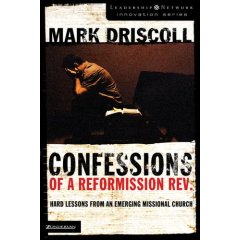Diamonds and a lot of rough
(I am going to begin doing book reviews at least once a month. This is the first of that series. I realize some of the stuff I read won't be relevant to everyone, but I hope to get a solid mix going.)
 Book Review: Confessions of a Reformission Rev. by Mark Driscoll
Book Review: Confessions of a Reformission Rev. by Mark Driscoll
This book isn’t for everybody, but it is for some. It deserves a medium recommendation because despite the many places this book fails, occasionally Driscoll hits gem insights.
Focusing heavily on the good aspects first, Driscoll’s structure (chapters which focus on different stages of growth: 0-45 people, 45-75, 75-150, etc.) combined with the story of personally wrestling with growth issues make the book enjoyable and highly readable. I finished it very quickly, and I am not a quick reader.
Structurally, the introduction stands alone proposing a series of distinctions in Christian ministry today: some of them are helpful (“Will your church be attractional, missional or both?”), some of them are a step backward (IE – “Will your church be an emergent liberal church or an emerging evangelical church?”). Driscoll is highly gifted in systematic thinking which makes his ability to draw distinctions over and again a common feature of the book. This both helps and hinders his cause. Seeing that one can be both attractional and missional is an original insight which flies in the face of much thinking in emerging circles. On the other hand, his knee-jerk tendency to over-emphasize second tier issues and throw sledgehammers at Christians who do not hold to a boldly conservative hermeneutic destroy his credibility as a first tier leader of emerging churches.

Driscoll’s self-analysis is quite helpful when he deconstructs the role of a senior pastor and redefines how he sees the vocation, for example, “I have accepted that I am not much of a pastor but rather a missiologist studying the city who leads a church filled with missionaries who reach the city with pastors who care for converts” (52).
His analysis of where churches focus their energies—dreaming, managing, justifying failures, and dying—is keen stuff. Driscoll encourages church leaders to never settle in the management comfort zone, but to consistently push the bar higher. If we do not, he rightly asserts, we are inviting stagnation or death.
On the downside, Driscoll is obsessed with his sexuality (a misplaced theme through out this book). He often comes across as the fundamentalist who annoys you most on CNN or Fox News: not because he is wrong, but because he has no tact. His tendency to demean people who have beliefs or behaviors he objects to often leads to dangerous overstatements. An example from the intro was that one’s belief in hell actually has salvific ramifications (“I am particularly concerned with…the questioning of a literal eternal torment in hell, which is a denial that holds up until, in an ironic bummer, you die and find yourself in hell” (22).) I assume Driscoll doesn't think believing in hell gets you into heaven, but if read "literally" his statements leaves that impression. (Who, by the way, doesn't long deeply that hell doesn't exist? It seems that one of the marks of a compassionate individual would be questioning "eternal torment" even if at the end of the day your views look more like Dante than CS Lewis.)
But the book hits its lows when Driscoll starts swinging prescriptive ethics like a club, demeaning people caught in a cycle of sin or theological confusion. He thinks his banter is humorous; it is actually base and cruel. Ironically in the last few pages he feels compelled to put forward all his own struggles asking for sympathy. It seems to be the mark of a particular sort of bad man who fragrantly insults those wrapped in moral failure, then turns and asks for pity for their own sin. I hope I miss read him on this front.
Thankfully, most of the readers of this book will be mature believers, primarily pastors who will easily slide over Driscoll’s over-exaggerations, self absorption, and straight out mean-spiritedness. If you buy it, cherish the good when you find it cause there is much to be discarded.
 Book Review: Confessions of a Reformission Rev. by Mark Driscoll
Book Review: Confessions of a Reformission Rev. by Mark DriscollThis book isn’t for everybody, but it is for some. It deserves a medium recommendation because despite the many places this book fails, occasionally Driscoll hits gem insights.
Focusing heavily on the good aspects first, Driscoll’s structure (chapters which focus on different stages of growth: 0-45 people, 45-75, 75-150, etc.) combined with the story of personally wrestling with growth issues make the book enjoyable and highly readable. I finished it very quickly, and I am not a quick reader.
Structurally, the introduction stands alone proposing a series of distinctions in Christian ministry today: some of them are helpful (“Will your church be attractional, missional or both?”), some of them are a step backward (IE – “Will your church be an emergent liberal church or an emerging evangelical church?”). Driscoll is highly gifted in systematic thinking which makes his ability to draw distinctions over and again a common feature of the book. This both helps and hinders his cause. Seeing that one can be both attractional and missional is an original insight which flies in the face of much thinking in emerging circles. On the other hand, his knee-jerk tendency to over-emphasize second tier issues and throw sledgehammers at Christians who do not hold to a boldly conservative hermeneutic destroy his credibility as a first tier leader of emerging churches.

Driscoll’s self-analysis is quite helpful when he deconstructs the role of a senior pastor and redefines how he sees the vocation, for example, “I have accepted that I am not much of a pastor but rather a missiologist studying the city who leads a church filled with missionaries who reach the city with pastors who care for converts” (52).
His analysis of where churches focus their energies—dreaming, managing, justifying failures, and dying—is keen stuff. Driscoll encourages church leaders to never settle in the management comfort zone, but to consistently push the bar higher. If we do not, he rightly asserts, we are inviting stagnation or death.
On the downside, Driscoll is obsessed with his sexuality (a misplaced theme through out this book). He often comes across as the fundamentalist who annoys you most on CNN or Fox News: not because he is wrong, but because he has no tact. His tendency to demean people who have beliefs or behaviors he objects to often leads to dangerous overstatements. An example from the intro was that one’s belief in hell actually has salvific ramifications (“I am particularly concerned with…the questioning of a literal eternal torment in hell, which is a denial that holds up until, in an ironic bummer, you die and find yourself in hell” (22).) I assume Driscoll doesn't think believing in hell gets you into heaven, but if read "literally" his statements leaves that impression. (Who, by the way, doesn't long deeply that hell doesn't exist? It seems that one of the marks of a compassionate individual would be questioning "eternal torment" even if at the end of the day your views look more like Dante than CS Lewis.)
But the book hits its lows when Driscoll starts swinging prescriptive ethics like a club, demeaning people caught in a cycle of sin or theological confusion. He thinks his banter is humorous; it is actually base and cruel. Ironically in the last few pages he feels compelled to put forward all his own struggles asking for sympathy. It seems to be the mark of a particular sort of bad man who fragrantly insults those wrapped in moral failure, then turns and asks for pity for their own sin. I hope I miss read him on this front.
Thankfully, most of the readers of this book will be mature believers, primarily pastors who will easily slide over Driscoll’s over-exaggerations, self absorption, and straight out mean-spiritedness. If you buy it, cherish the good when you find it cause there is much to be discarded.

0 Comments:
Post a Comment
<< Home